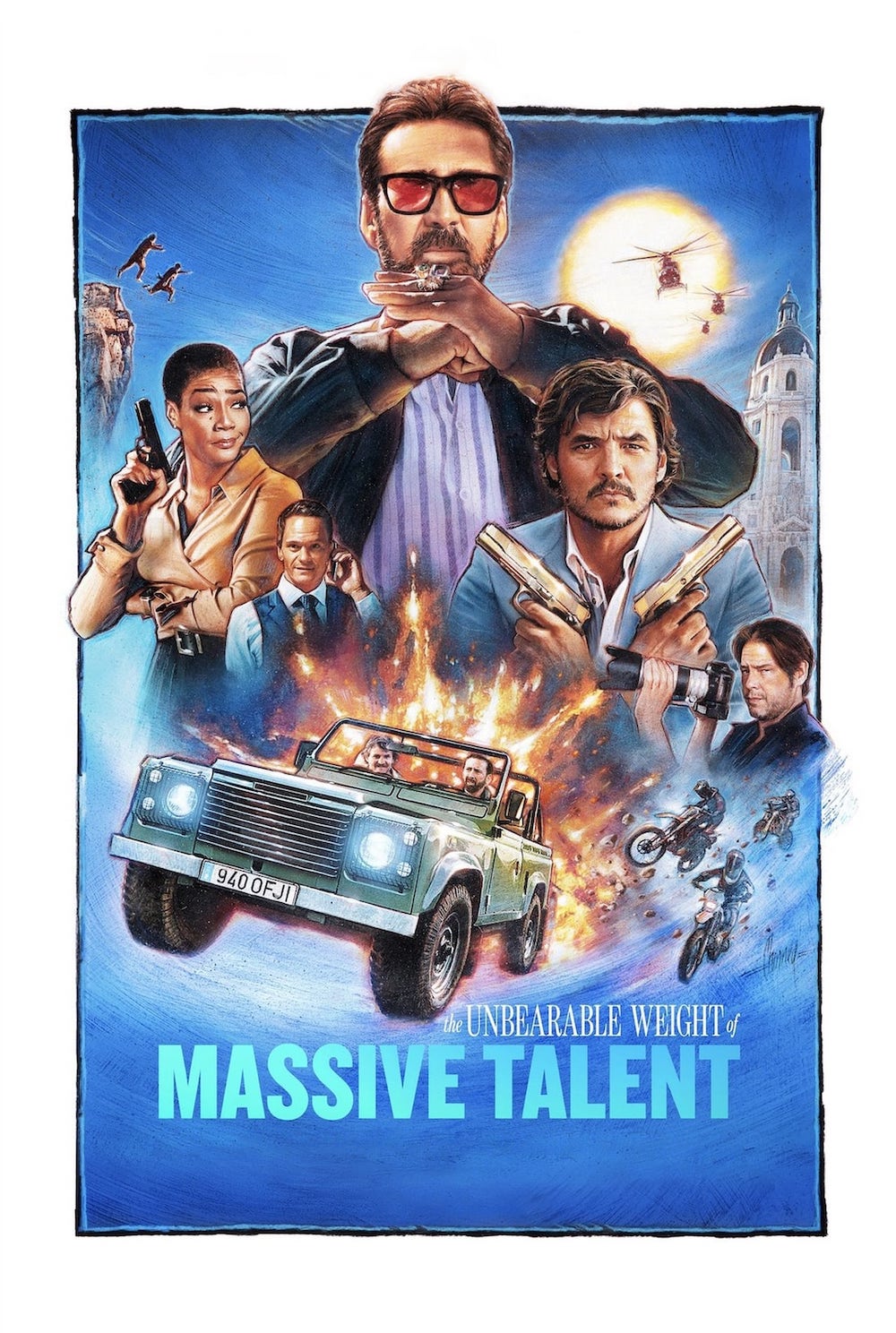THE UNBEARABLE WEIGHT OF MASSIVE TALENT (2022)
Hollywood actor Nicolas Cage accepts a highly paid request to attend the birthday part of a wealthy super-fan in Mallorca.

Hollywood actor Nicolas Cage accepts a highly paid request to attend the birthday part of a wealthy super-fan in Mallorca.


In a media landscape saturated with nostalgia-driven re-workings of well-trodden stories, The Unbearable Weight of Massive Talent is a breath of fresh air. Nicolas Cage, aided by writer-director Tom Gormican, displays a fun and perceptive attitude towards his own persona. This auto-fictional portrait of ‘Nick Cage’ finds him unsuspectingly wrapped up in an international criminal investigation.
Nick Cage (Nicolas Cage) is down on his luck after being looked over for a part intended to put him back on the map. To make matters worse, his devotion to his work and generally self-centred nature has cost him his relationship with his ex-wife Olivia (Sharon Horgan) and teenage daughter Addy (Lily Sheen). To avoid spiralling into debt, Cage resolves to quit acting and takes a highly-paid gig as a guest at a Spanish billionaire’s birthday party. Once there, the CIA inducts him into their plan to save the Catalonian president’s kidnapped daughter, whom the CIA agent Vivian Etten (Tiffany Hadish) believes could be held captive on the same property where Cage is staying.

Cage takes on an interesting persona in his personal life as a pretentious fan of vintage, obscure cinema that has a deeply earnest and researched approach to his craft. This is a source of tension in his family life, since his daughter’s resistant to his snobby taste, but becomes a source of joy and a chance for growth in his budding friendship with the Spanish billionaire Javi (Pedro Pascal). This love for cinema extends into the film’s employment of classic tropes from each of the genres it draws from, which it manages to do while still keeping things surprising. Although it wears many hats, The Unbearable Weight maintains a successful balance. The film touches on rarely explored nuances of parental relationships and male friendships at the precise moments where the tensions of the spy-thriller plotline are at their height.
The choice to work a drug-infused buddy comedy into the centre of Unbearable Weight firstly imbues it with a levity that makes it a joy to watch. Secondly, it marks a centralisation of masculine camaraderie that’s been markedly absent from Hollywood in the past few years following the cries for representation sparked by the #MeToo movement. In a political climate where many young men feel more alienated than ever, it’s reassuring to see the heartwarming development of classic male friendships found in a long history of incredible films from John Cassavetes’ Husbands (1970) to John Hamburg’s I Love You, Man (2009).

Cage gives an equally raw and playful performance that both picks apart and inflates his celebrity self-image. Through riffing on his status as a legend, he makes the fantasy of his mythology a cinematic reality. Because of Unbearable Weight, audiences can rest assured that if the real Nick Cage was asked to engage in “spycraft” and “subterfuge,” he could deliver! Of course, the film itself is ultimately a fantasy of its own, and consistently reminds the audience of this by making things go over the top. Occasionally this includes an uncomfortable amount of overacting, but mostly it’ done through comedically elaborate violence.
The playful approach Cage takes to his own persona in the movie carries through in every other facet. The title, The Unbearable Weight of Massive Talent, is indicative of the film’s overarching tone of irony-tinged grandiosity. It’s a meta-commentary not only on Cage’s celebrity but on filmmaking itself. As the film-within-the-film takes centre stage, we come to understand the fabricated myth-making that is filmmaking. However, the resounding message of the film is unmistakable: if an artist is to achieve any happiness or fulfillment in life at all, their creative life must eventually take a back seat (or at least slide into the passenger side) to personal relationships.

As an auto-fictional portrait of an actor whose declining success forces him to consider retiring, Unbearable Weight bears a natural comparison to Casey Affleck’s I’m Still Here (2010), starring Joaquin Phoenix. Phoenix’s career has slanted slightly more in the direction of independent dramas with smaller budgets, while Cage’s career finds this type of work sprinkled in amongst action-packed blockbusters like National Treasure (2004) and Ghost Rider (2007). The difference in the most recognisable work of these two actors suggests the differences in their auto-fictional films. Unbearable Weight has a bit more sincerity to it and a lot more intensity, with elements like car chases and spy plots worked in to bring the film onto the engaging and highly produced level of Cage’s other work.
Cage appears well aware of the humor and happiness associated with his persona and finds a point of access to this specific blend of emotion through The Unbearable Weight. His self-titled character’s marked sincerity in a blatantly OTT scenario has the dual-pronged charm of light irony and truly heartwarming emotion. In a world of heavily political art, Cage has decided it’s time to have fun at the theatre again.
USA | 2022 | 107 MINUTES | 2.39:1 | COLOUR | ENGLISH


director: Tom Gormican.
writers: Tom Gormican & Kevin Etten.
starring: Nicolas Cage, Pedro Pascal, Sharon Horgan, Ike Barinholtz, Alessandra Mastronardi, Jacob Scipio, Neil Patrick Harris & Tiffany Haddish.
